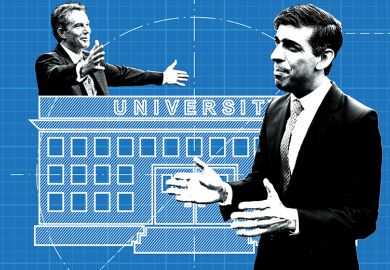Launching Labour’s education manifesto at the University of Southampton ahead of the 2001 election, then prime minister Tony Blair declared there was “no greater ambition for Britain than to see a steadily rising proportion gain the huge benefits of a university education”.
The party’s offering to the country this time around offered a slightly less full-throated endorsement of the value of a degree, promising instead to “continue to support the aspiration of every person who meets the requirements and wants to go to university”.
Yet the return of a Labour government – the party that coined the UK’s 50 per cent higher education participation target that was eventually met in 2019 – has increased hopes that access to higher education will rise up the agenda again after years of stagnating progress.
“Labour is the party that kickstarted widening participation in the modern era and I hope – and believe – that it is still part of what it stands for,” said Graeme Atherton, director of the National Education Opportunities Network at the University of West London. But he said universities had to do more to make a case for why they matter in the party’s wider opportunity agenda.
Colin McCaig, professor of higher education policy at Sheffield Hallam University, was less sure. “My slight worry is that they don’t,” he said, when asked if he felt Labour still wanted more people to go to university.
It wasn’t just Labour who backed expansion in the early 2000s, Professor McCaig pointed out, but all major political parties agreed it was necessary.
“The consensus of this time is definitely different,” he said. “I think instinctively Labour feel people have a right to go to higher education, but there is no consensus on expansion, because financially the picture isn’t as good.
“Even amongst a lot of Labour-supporting people there is an idea that too many people are doing higher education. I don’t think you will get a pro-widening participation drive, but we can hope for no retrenchment.”
That would, in the eyes of many, still be an improvement on the last Conservative government, known in its latter years for its frequent attacks on “rip-off degrees”.
In 2020, in what was widely seen as an end to the expansionist era, then higher education minister Michelle Donelan told the launch of the Neon group Professor Atherton runs that universities had been “taking advantage” of young people, “particularly those without a family history of going to university”, by recruiting them on to courses “that do nothing to improve their life chances”.
Alongside this change in rhetoric, reforms of the student loan system and rising inflation have also made going to university more expensive, with disadvantaged students worst affected.
Overall numbers applying for places in UK universities have been falling, despite a growing number of 18-year-olds in the population. Research published by Professor Atherton earlier this year further found that in most areas in England state school pupils who had received free school meals had a less than one in four chance of going on to higher education by age 19.
While the number of disadvantaged students entering universities had increased by 1.22 per cent per year on average between 2005-06 and 2011-12, the research concluded, this had fallen to a more modest 0.89 per cent increase per year from 2011-12 to 2021-22.
Furthermore, the gap between poorer young people and their better-off peers “has barely shifted”, said Rebecca Montacute, head of research and policy at the social mobility charity the Sutton Trust.
“Even as more and more people have gone to university, that gap has hardly budged and that is something we think the new government absolutely should tackle.”
Arguably, therefore, Labour could focus on access without driving ever greater numbers into higher education, but Dr Montacute said “the only way we have really seen big changes in how many disadvantaged students get to go to university is when there have been big changes in how many people go to university overall. It is a lot easier to increase access by upping places than it is to displace people.”
It has been universities themselves that have driven much of the widening participation work of recent years, primarily channelled through their access and participation plans required by the regulator, the Office for Students.
Campus resource: What can the new government do to strengthen academic-policy engagement?
This has sometimes had the effect of making the work too inward looking, according to Professor Atherton. “The UK is one of the only countries in the world that has these documents, they are really important,” he said. “But they have become all about what individual institutions can do on their own.
“It has moved away from the need to look at place and coherence with other things going on, other sectors. In the era of 50 per cent, we were very outward looking. We sat and spoke to local authorities, to skills councils and other key players of the time about working collaboratively. While this still happens in different parts of the country, it has become less of an overall strategic priority.”
Another issue, according to Professor Atherton, is that severe cuts have been made to staff teams as universities across the board restructure under financial pressure, leaving no one to fulfil the commitments made in their access plans.
“We’ve heard numerous cases of universities cutting their widening participation departments because they can’t afford to support it any more,” he said.
“We’ve contacted people asking them to renew as a member of the network and, not only are they not there themselves any more, but there is no department either.”
A national scheme – now called Uni Connect – has long existed to drive the agenda, but this too has been hampered by shifting priorities and a lack of funding, according to a report published earlier this year.
Professor McCaig said the Conservatives had made Uni Connect “quite restrictive” and – like the access plans – very focused on evaluation and monitoring, so one thing Labour could do was to give the programme more leeway, especially when being adapted to local circumstances.
Aside from looking again at the formal processes of widening participation, most agree the new government cannot tackle the issues without doing something about student funding. Loans have long lagged behind inflation and the household income threshold at which students qualify for more support has been frozen at £25,000 since 2008.
“I expect a review of maintenance grants and loans for the many students now struggling with the costs of university life – this may be part of a wider review of university finances which are clearly unsustainable,” said Lee Elliot Major, professor of social mobility at the University of Exeter.
“We are now reaching crisis point for many students and I worry about the impact student poverty is having on their mental health and academic progress.”
While this would likely be an expensive endeavour, Professor Elliot Major said it could be coupled with “equalising policies” that cost next to nothing, such as a UK-wide programme of undergraduate tutors being rolled out in schools, based on a successful pilot programme run by Exeter.
Another change he suggested was for the government to show a more positive attitude to contextual admissions, where universities offer places to disadvantaged students who have achieved lower grades in recognition of the difficulties they may have faced.
Dr Montacute agreed political backing would “go a long way” in empowering more universities to embrace the idea, while the government could also mandate universities to make it clearer when contextual offers are available, such as displaying them on their website or via admissions service Ucas.
Professor Atherton said that “diversity and flexibility” of what universities offer was an important aspect of widening access to “give people who want different things from HE new opportunities”.
For the last government this involved a big push on degree apprenticeships, which Professor Atherton said had “raised people’s expectations about their chances of doing one but then many found there weren’t the positions available”.
“The reality is working-class students, poorer students, on average are far less likely to get on to degree apprenticeships,” said Professor McCaig. “The majority of people doing them tend to be people already in the workforce and are doing them as workplace training.”
The new government has signalled its intention to reform the apprenticeship levy – paid by businesses with a pay bill of more than £3 million – to include more skills training opportunities, but the Sutton Trust has highlighted that this may further reduce the number of apprenticeships unless some funding is ringfenced.
“We need more of these opportunities, but you need the same level of scrutiny on them,” said Dr Montacute.
“People assume that apprenticeships will help with widening access, but we really encourage employers to monitor the socio-economic background of their incoming apprentices and not just assume they must be more diverse because they are apprentices. Our data has found, particularly for higher-level apprenticeships, that is just not the case.”
Register to continue
Why register?
- Registration is free and only takes a moment
- Once registered, you can read 3 articles a month
- Sign up for our newsletter
Subscribe
Or subscribe for unlimited access to:
- Unlimited access to news, views, insights & reviews
- Digital editions
- Digital access to THE’s university and college rankings analysis
Already registered or a current subscriber?








